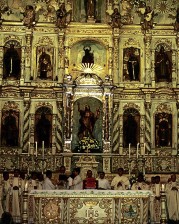How Christian faith grew in old Pampanga settlement

PAMPANGA priests celebrate Mass at the Santiago Apostol Church in Betis. Behind them is the intricate “retablo mayor.” TONETTE OREJAS
GUAGUA, Pampanga—Betis, one of Pampanga’s ancient settlements and where the Augustinians spread the early Catholic missions in the Philippines, capped the 440th anniversary of Christianity in the province with a book that an official of the National Commission for Culture and the Arts (NCCA) hailed as pioneering.
“It is, first, a tour guide’s book,” Pampanga Auxiliary Bishop Pablo Virgilio David said of Nina L.B. Tomen’s 231-page coffee-table book “Suli (Legacies of Santiago Apostol Church of Betis).”
“Suli,” in Kapampangan, means shoot or a new plant growth.
The book answers the need of local folks for a definitive reference when pilgrims and tourists ask about the church, dubbed by some as the Sistine Chapel of the Philippines, and its people, said David, a Betis native.
Because it is rich in details and photographs, a result of Tomen’s research and her collaboration with David, Archbishop Paciano Aniceto called “Suli” during its Aug. 27 launch as a “pathway to salvation history,” referring to the “Gospels in colors, scriptures in arts” drawn on the ceilings, walls and nooks of the church.
To resident Banjo Serrano, the book is simply a “dream come true for us in Betis.”
It documented what this former town has become in over four centuries, said Serrano, president of the Parish Pastoral Council, as he thanked the NCCA for helping publish the book alongside the St. James the Apostle Heritage Foundation.
Tomen said Betis, together with Lubao in Pampanga and Calumpit in Bulacan, was a mission chapel of Sto. Niño de Tondo in 1572, just after the Spanish colonial troops defeated the Macabebe ruler Tarik Soliman (Bambalito).
The Muslim settlements along the river behind Betis put up slight resistance and took to Christianity with intense devotion, she said.
The old town has two representations of its patron. The first is St. James the Apostle while the second is St. James the Moor-slayer. Just the same, residents call them both “Apung Tiago.”
Old residents attributed their safety from Mt. Pinatubo’s lahar flows because a man on a horse, whom they believed to be Apung Tiago, supposedly gave them warnings on an impending disaster in 1995.
Residents gathered for focused group discussions by Tomen confirmed that the major legacies of Betis are its church as a landmark of faith, its woodcraft industry, its priests and the Centro Catolico culture that evolved and is expressed in rituals, traditions and daily life.
“The roots of the Christian faith grew in Betis,” said David. That was a labor of Augustinians and Filipino priests as well.
By 1959 alone, Betis produced 60 priests for the Diocese of Manila and various religious orders.
Annexed in 1904 to Guagua, Betis and the seven villages that composed it have thrived on many fronts instead of dying, said Serrano.
For Prof. Regalado Trota Jose, head of the NCCA committee on archives, the book is a “pioneer.” “It presented the tangibles and intangibles by situating the church within its culture and arts,” said Jose.
He said the book provided a model for other places planning to document its past and present. “It’s a very readable book. It’s worth sharing,” said Jose. “Its constant mention of traditions, with reference to children, is a way of telling them to carry over the Betis way of life.”
Interspersed are accounts of folk artists and a teacher of Caton (Catechism) that make the reading more enjoyable.
“Suli” is available through Betis Craft, (045) 9000-309, or Joan Colasito, 0917-405-0442.